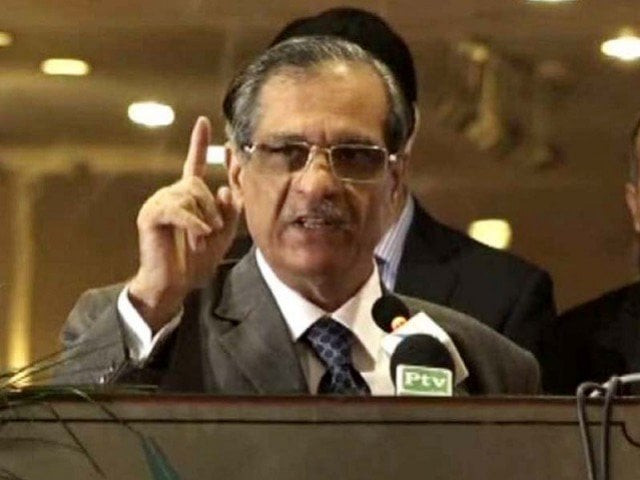CJP for 'strong, independent policing'
Justice Saqib Nisar addresses launch ceremony of police reforms committee report in Islamabad

Chief Justice of Pakistan Mian Saqib Nisar. PHOTO: FILE
A ceremony to mark the launching of Police Reforms Committee (PRC) Report titled “Police Reforms: Way Forward” was organized by the Law and Justice Commission of Pakistan at the Supreme Court with Chief Justice of Pakistan Mian Saqib Nisar as the chief guest.
The PRC constituted by the Chief Justice emphasized the need to redress public complaints against police at the central, provincial, regional and district level as the highest priority.
The committee worked on three broad areas of its terms of reference (ToRs), including model police law, accountability and operational matters and legislative reforms.
The report recommended improving quality of investigation by establishing state-of-the-art training institutes and better forensic support.
It includes revamping the urban policing by organizing the police command into eight wings including administration, traffic, operations, law and order, investigations, security, community relations and communications & technology.
The report suggested an efficient Alternative Dispute Resolution mechanism to reduce the burden on courts and the federal law of Alternate Dispute Resolution Act, 2017 be extended to the entire country or the provinces should replicate it.
The report recommended establishment of mediation centers, institutes of arbitrators and mediators in all provinces.
The report said that efficiency of Criminal Justice System be enhanced by addressing the issue of multiplicity of laws on different subjects. The report recommended that the National Counter Terrorism Authority Act, 2014 be implemented in letter and spirit.
PRC Report also suggested legislative reforms and continuity of a uniform federal police law. It said that important amendments be made in the police-related laws like the Criminal Procedure Code and Qanoon-e-Shahadat Ordinance.
The report also suggested to link lawmaking with budget-making so that when laws are formulated their implementation does not fall prey to dearth of resources.
By employing a diagnostic approach in the public’s interest, and forming a body solely of professional police officers, the top judiciary in May last year for the first time reposed confidence in the institution’s top brass’s ability to reform itself.
Similarly, Provincial Justice Committees would also be made operational.
A Steering Committee headed by Justice Asif Saeed Khosa worked on implementation of the recommendations.
Addressing the ceremony, Chief Justice Mian Saqib Nisar said that the report provided a roadmap to revamp the police department keeping in view the modern challenges.
Justice Nisar expressed the hope that implementation of recommendations in letter and spirit would bring a visible change in the functioning of the department.
The Chief Justice said that depoliticizing police and making it people-friendly was the core of the recommendations.
The top judge observed that a strong police force was a pre-requisite in the transmission of transparent and efficient justice system in any country.
Justice Nisar stressed that police had an important role to play in maintaining law and order in the country. Therefore, making the force fully independent and strong was mandatory.
Chief Justice lauded the efforts and contribution of the members of PRC who worked day and night to compile the report.
Speaking on the occasion, LJCP secretary Dr. Muhammad Raheem Awan said that his body was assisting the Supreme Court in several public interest cases and provided support to the Police Reform Committee with the ultimate aim of creating an efficient and professional police force to meet law & order and security-related challenges in the country.
Dr. Awan asserted that police was the most important part of the criminal justice system and it was the responsibility of the government to increase its responsiveness and professionalism toward the police force. He thanked Justice Asif Saeed Khosa for his valuable contribution toward the purpose.
Convener of Police Reforms Committee and former IGP Sindh Afzal Ali Shigri stated that the performance of police was directly linked to the delivery of justice. Former IGP said that several efforts had been taken to improve the performance of criminal justice system. But the present initiative stood out as it was initiated by the Supreme Court of Pakistan.
Former DG FIA Tariq Pervez laid emphasis on a competent, accountable and operationally autonomous police system. He emphasized on the effective public complaints redressal system for police reform.
The redressal system would have two tiers at the provincial level. The complaints would be heard by Additional IGs / DIGs and at district level by the SPs/DSPs.
Former DG suggested that investigation branch in police should be made a separate unit, best officers be posted and promotions made on merit. He also spoke for providing forensic support to the investigation teams.
Sindh IGP Dr. Syed Kaleem Imam informed that provincial police had developed complaint redressal mechanism up to the district level, Karachi police investigation department had been revamped, investigation setups at town level had been enhanced and a post of Additional IGP investigation created.
The IGP further informed that 200 inspectors for investigation, 170 inspectors for law and 30 PDSPs with a career growth plan had been recruited. The budget for investigation had been increased and curriculum model for forensic investigation developed.
Former IG police Dr. Shoaib Suddle presented vote of thanks and stressed on the improvement of policing in the country. He urged the government to actively engage in the updating and modernizing police laws.



















COMMENTS
Comments are moderated and generally will be posted if they are on-topic and not abusive.
For more information, please see our Comments FAQ